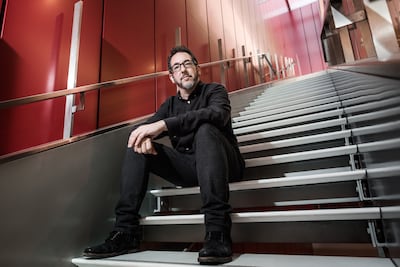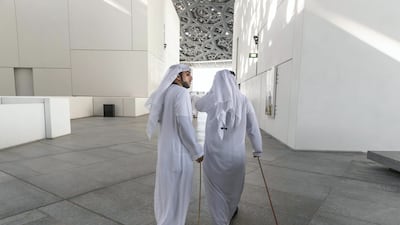Read more: Sheikh Khalifa's life and legacy remembered
Sheikh Khalifa, who died on May 13, 2022, aged 73, left behind a transformed UAE cultural scene.
The pioneering developments and institutions that sprung forth during his 18-year term are many, including the Manarat Al Saadiyat cultural district, home to Louvre Abu Dhabi, NYUAD Arts Centre and the soon-to-come Zayed National Museum and Guggenheim Abu Dhabi.
Other achievements can be heard via regular concerts and festivals boasting performances by internationally acclaimed orchestras and popular music acts.
This is not only down to strategic planning, says Abu Dhabi Music Arts & Foundation founder Huda I Alkhamis-Kanoo, but borne from the fruits of a long-term vision.

“The late president Sheikh Khalifa championed the UAE’s impressive rise in the art and cultural scene.
“This was through understanding and welcoming the advancement of cultural development from early on,” she told The National.
“His Highness nurtured and cultivated the belief instilled by the nation’s Founding Father, Sheikh Zayed, that culture and the arts are the pillars of a nation’s progress, by supporting and establishing many of the major projects that contributed to the nation’s cultural evolution and Abu Dhabi’s rise as an artistic hub over the past two decades.”
Alkhamis-Kanoo says the Abu Dhabi Festival — launched by Admaf in 2004 and featuring international and Emirati music and theatre performances, an arts exhibition and cultural workshops — was born to fulfil a wider mandate.
“The establishment of Abu Dhabi Festival, at the time when Sheikh Khalifa came to power, expanded Abu Dhabi’s contributions on the global stage, strengthening the city’s and the nation’s presence in the international conversation on creativity and innovation,” she said.
“This is in line with Sheikh Khalifa’s and the government’s vision to empower the nation across all industries to make it the most advanced in the world.”
The importance of collaboration
It was this kind of industry buy-in that allowed the Louvre Museum to take the unprecedented step of opening a satellite venture in the UAE in 2017.
“This would not have been possible if, over the last 25 years, we did not see the rapid acceleration of the artistic and cultural landscape under the UAE’s leadership,” said Louvre Abu Dhabi director Manuel Rabate.

“With their support, Abu Dhabi built the infrastructure, launched various projects and partnered with international heavyweights to progress arts and culture in the UAE.”
In addition to bringing world-class exhibitions to the UAE capital, Rabate says Louvre Abu Dhabi is in an ideal position to promote the city’s collaborative ethos to international counterparts.
“As a global centre of arts and culture, Louvre Abu Dhabi also plays a critical role in advancing the emirate’s cultural narrative on a global scale, and speaks to Abu Dhabi’s spirit of openness, connectivity and progression,” he said.
“It is an exporter of creativity, giving a platform for local and regional artists to share their works and contribute to global conversations that define the world we live in today.”
Abu Dhabi cultural institutions are known for collaborations, after all.
Abu Dhabi Festival brought performances and exhibitions to Manarat Al Saadiyat, while Louvre Abu Dhabi has collaborated with NYU Abu Dhabi Arts Centre for concerts.
Some UAE culture lovers may view these partnerships as the norm, but NYU Abu Dhabi Arts Centre artistic director Bill Bragin describes such tie-ups as increasingly rare.

“It comes down to a question of how you value the importance of the arts, because we are living in a time now where in many places in the world the arts are under attack,” he said.
“What has happened here over the course of the last two decades is that, under the leadership of Sheikh Khalifa, and at the very highest levels of government, you are seeing not only huge financial investment into the arts — such as developing great physical facilities and infrastructure for organisations — but also putting forward the kind of values that places arts, culture and education as central to the continued development of the country. It is a national priority.”
The bold approach hasn’t gone unnoticed abroad.
Global creative sectors and institutions are increasingly viewing the UAE as a hub for culture, exemplified by the successful hosting of Expo 2020 Dubai, the World Conference on Creative Economy in Dubai and Culture Summit Abu Dhabi.

In 2021, Unesco listed Abu Dhabi as a City of Music, while in 2025, Dubai will host the International Council of Museums conference, a triennial event bringing together the largest global gathering of museum representatives and professionals.
Curiosity and tolerance
Pop stars and orchestras also hear the rhythm from the UAE.
This makes the gig of concert and music festival promoters, such as Thomas Ovesen, relatively easier.
The Dane is responsible for some of the Middle East’s biggest music events, bringing the likes of Ed Sheeran, One Direction, Justin Bieber, Mariah Carey and Elton John to the UAE over the past two decades.
The fact he chose to launch his latest venture, the live event company T.O.P Entertainment, in the UAE last year, underscores the country's place as a leading cultural and entertainment destination.
“The last 20 years saw the UAE significantly change its position in the international live events world.
“It has become much easier for promoters to convince international artists to come here because, before, they may have not understood the difference between the UAE and other surrounding countries and cities,” he said.
“But with the growing profile of the UAE, these acts not only know the place but they are excited about coming here.
“The UAE has now achieved such a status that I regularly get a call from the team of a top artist to make sure a UAE show can also be part of the latest tour.”

That lure is also felt in comparatively niche music circles.
Dubai Opera has hosted more than 20 orchestral performances over the past two months and the Abu Dhabi Classics concert series continues to bring classical music stars to the UAE.
Ronald Perlwitz, head of the music programme for the Department of Culture and Tourism — Abu Dhabi and curator of Abu Dhabi Classics, says the real satisfaction of his role is found offstage.
“I see the importance of culture in the UAE in the audiences that come to these shows, which are a wonderful mix of Emirati and Arabic audiences with western crowds — that's both for Arabic and western classical music concerts,” he said.
“You rarely see this in some of the more musically established cities in Europe where the crowds are limited to a certain age, for example.
“For this to happen, you need to promote not only the importance of tolerance and encouraging collaboration, but to also be curious about the world and see what is out there.
“On that score, the UAE has been achieving this in perfect harmony.”
A version of this story was first published on May 18, 2022


